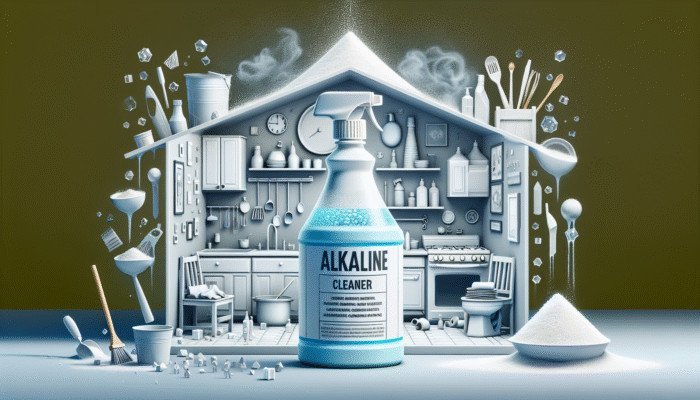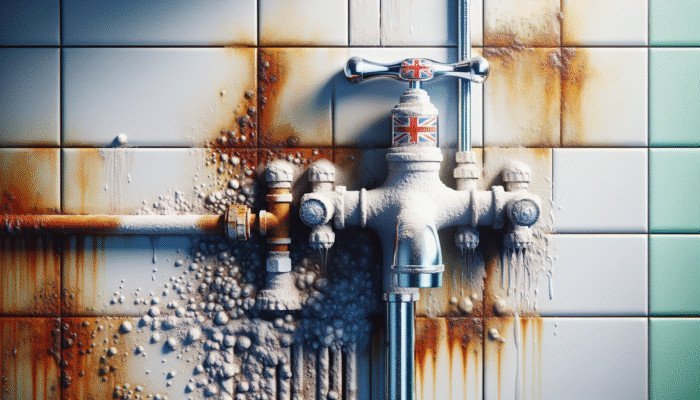


September 27, 2025 by
David Allen
Summary of the article Alkaline Cleaners for Tough Stains: Effective Solutions:

Alkaline cleaners are powerful agents designed to tackle tough stains and grime. With high pH levels (typically between 9 and 14), they contain ingredients like sodium carbonate or sodium hydroxide, making them especially effective on organic messes such as grease, oil, and food residue. Unlike acidic cleaners that target mineral build-up, alkaline products are ideal for cleaning kitchens and bathrooms where such stains are common.
Their cleaning strength comes from how they break down the molecular structure of stains. When applied, these cleaners disrupt the bonds within organic matter, turning grime into a more soluble form that can be easily wiped or rinsed away. Their ease of use makes them particularly useful in UK homes, where cooking often leads to stubborn grease build-up.
However, care is key. While effective, alkaline cleaners can be harsh on some surfaces. Prolonged contact may damage natural stone, metal finishes, or some plastics. Always test on a small area and avoid using them on delicate materials.
Alkaline cleaners work through basic chemistry. They contain hydroxide ions, which react with organic stains like grease or oil. These ions break down the stain’s molecular structure, making it easier to wipe or rinse away.
Understanding this process helps you choose the right product. For greasy kitchen messes, a stronger alkaline solution works best. In bathrooms, where mould or soap scum is common, a balanced pH cleaner might be more effective at dissolving build-up without being too harsh.
Hot water boosts cleaning power by helping stains dissolve faster, especially useful in UK kitchens, where cooking oils and burnt residues are common. Warm water and the right cleaner make the job much easier.
While alkaline cleaners are powerful, they need to be used with care:
Remember the environmental side—some cleaners contain harsh ingredients that can harm aquatic life if rinsed down the drain. To stay safe and sustainable, choose eco-friendly or UK-compliant products when possible.

Grease and oil stains are a common problem in UK kitchens, usually caused by everyday cooking and food prep. These stains can cling stubbornly to surfaces and become harder to remove, especially once oils harden and form a slick film.
That’s where alkaline cleaners come in. Their high pH and potent formulation are ideal for breaking down the fat molecules in grease, loosening the bonds that make these stains so tough.
To get the best results:
This method saves time, reduces surface wear, and makes the whole process far less of a chore.
Mould and mildew are frequent issues in damp environments, bathrooms, basements, and poorly ventilated areas. These fungi thrive on moisture and organic material and spread quickly if not dealt with properly.
Alkaline cleaners can help. Their chemistry breaks down the organic matter that supports fungal growth and destroys mould at its source.
Here’s how to keep mould at bay:
Safety tip: Always wear gloves, work in a ventilated space, and read the label. Some formulas may require eye protection or dilution.

Several brands have become known for offering effective alkaline cleaning solutions in the competitive cleaning market. UK consumers often trust brands like Cif and Mr Muscle for products that tackle stubborn stains. Cif, for example, is well recognised for its cream cleaner, which uses an alkaline solution to cut through grease and grime effortlessly—a favourite in many households.
Mr Muscle is also highly regarded for handling challenging cleaning tasks. Their product range includes items specifically designed for kitchens and bathrooms, with alkaline formulations that effectively break down tough stains. Many users appreciate that Mr Muscle offers ready-to-use sprays, making cleaning less of a chore while still delivering excellent results.
Another notable brand is Astonish, which champions environmentally friendly cleaning options. Their alkaline-based products are biodegradable and free from harsh chemicals, appealing to those prioritising sustainability. These products are widely available in UK supermarkets, ensuring they are accessible to conscientious shoppers.
For more specialised needs, brands like Zep and Ecozone offer targeted alkaline cleaners designed to address issues such as limescale build-up or mould. These cleaners are often enhanced with extra ingredients for improved performance.
Crafting your DIY alkaline cleaners using everyday household items is cost-effective and environmentally friendly. Baking soda, with its mild alkaline properties, can be blended with water to form an excellent paste for scrubbing tough stains from various surfaces.
Mixing baking soda with vinegar produces a chemical reaction for a stronger cleaning solution that generates carbon dioxide bubbles. These bubbles help to lift stubborn stains and grime, making the mixture especially useful for cleaning kitchens and bathrooms. However, using this mix immediately after preparation is essential, as its effectiveness decreases over time.
Another handy DIY cleaner uses borax, a naturally occurring mineral with high alkalinity. When dissolved in hot water, borax forms a powerful cleaning solution capable of tackling grease, limescale, and even mould. This makes it a valuable addition to any household cleaning kit, particularly for dealing with persistent stains.
When preparing these DIY solutions, it is essential to consider the surfaces being cleaned to avoid potential damage. While baking soda is generally safe for most surfaces, extra care should be taken on delicate materials. Ultimately, making your own alkaline cleaner is a simple and effective way to address tough stains without resorting to commercial products.
Locating alkaline cleaners in the UK is straightforward, with plenty of retail options available. Major supermarkets such as Tesco, Sainsbury’s, and Asda usually stock a wide range of well-known brands, making it easy for shoppers to find their favourites. Discount retailers like B&M and Poundland also provide affordable cleaning options, including effective alkaline cleaners that won’t break the bank.
Local health food stores and cleaning supply shops offer a broader selection for those seeking more specialised or eco-friendly products. Retailers like Holland & Barrett often feature biodegradable and environmentally conscious cleaning options that cater to the growing demand for sustainable solutions.
Online shopping has further simplified access to these products. Websites such as Amazon, Ocado, and eBay offer extensive ranges of alkaline cleaners, complete with user reviews to help with purchasing decisions. This convenience allows shoppers to compare prices and find the best deals from the comfort of their own homes.
Many brands also maintain official websites where you can purchase directly, often with exclusive discounts or promotions, ensuring you find the right alkaline cleaners for your needs.
Safety should always come first when using alkaline cleaners for tough stains. Begin by carefully reading the labels to understand their chemical makeup and any specific safety instructions. Always follow the manufacturer’s guidelines, including dilution ratios and application methods, to ensure the cleaner works effectively and safely.
Wearing protective gear is essential to prevent skin and eye irritation. Gloves, goggles, and even masks provide extra protection, especially when working with concentrated alkaline solutions. This is particularly important in areas with poor ventilation, such as basements or bathrooms, where fumes can build up.
Store alkaline cleaners safely in a cool, dry place out of reach of children and pets, ideally in their original packaging with labels intact. When disposing of these products, follow UK regulations. Many local councils offer guidelines for handling hazardous household waste responsibly.
Finally, always wash your hands thoroughly after using cleaning products, even if you wore gloves. This careful approach protects you and helps keep your home a healthier and safer environment.
The most important thing when using alkaline cleaners for tough stains is to stay safe. These cleaners are powerful, which is why they work so well, but they can also irritate your skin if you’re not careful.
Always wear rubber or latex gloves to protect your hands. These help prevent any cleaner from coming into contact with your skin, which could cause redness, itching, or even chemical burns.
If you’re using a spray, wearing protective glasses is also wise. If the cleaner splashes or sprays back, your eyes are shielded. Consider a face mask or shield for extra protection, especially if you’re dealing with a large area or using a strong cleaner.
Make sure you have good ventilation. Open a window or turn on a fan if you’re cleaning in a small space like a bathroom or cupboard. Fresh air helps clear out any fumes so you don’t breathe them in.
It’s also a good idea to let everyone else in your home know what you’re using. Keep cleaners clearly labelled and stored away safely—ideally in a locked cupboard, especially if there are kids or pets around.
Most alkaline cleaners need to be diluted before use. This just means mixing them with water. Check the instructions on the bottle — they’ll tell you the right amount to use, like one part cleaner to ten parts water (1:10).
Important tip: Always add the cleaner to the water, not the other way round. Pouring water into a strong cleaner could cause it to splash or fizz up.
Use a clean container only for cleaning jobs — this helps keep things safe and uncontaminated.
Before you start spraying it all over your tiles or counters, do a quick patch test. First, try a small hidden area to make sure it doesn’t damage the surface. If it looks fine after a few minutes, you’re good to go.
And here’s a clever trick: use warm water when mixing. Heat helps break down dirt faster, so your cleaner will work better with less scrubbing.
Once you’re done cleaning, make sure you store your alkaline products safely:
Keep them in their original bottles with labels on.
Put them in a cool, dry place — away from sunlight, heat, or damp cupboards (under the sink is often not ideal).
Please make sure they’re out of reach of children and pets.
Check your bottles from time to time. If something is leaking, damaged, or past its use-by date, it’s time to get rid of it.
But don’t just pour them down the sink or toilet. That can damage your plumbing and pollute the environment. Instead, check your local council’s website—most offer special disposal or recycling services for cleaning chemicals.
If you’re unsure what to do, the label will usually offer advice, or you can call your local waste service.
By properly storing and disposing of alkaline cleaners, you’ll not only keep your home safer but also help the planet.
In the heart of UK homes, kitchens frequently encounter a variety of stains and messes, ranging from grease splatters to burnt food residues. Alkaline cleaners are particularly suited for addressing these everyday challenges. Their ability to break down organic materials makes them ideal for cleaning kitchen worktops, stovetops, and appliances. When confronted with stubborn grease or food stains, an alkaline cleaner can deliver effective results, enabling homeowners to maintain a hygienic cooking environment.
For optimal outcomes, users should apply the alkaline cleaner directly to the stained area and allow it to dwell for a few minutes. This dwell time enables the cleaner to penetrate and break down the stain effectively. After the appropriate dwell time, a simple wipe with a cloth or sponge can remove even the toughest residues, leaving surfaces brilliantly clean.
Selecting the correct type of alkaline cleaner for kitchen surfaces is crucial. Some products are specifically formulated for use in food preparation areas, ensuring they are safe and effective for cleaning countertops and cutting boards. Always verify that the cleaner is food-safe, and thoroughly rinse surfaces with water after cleaning to eliminate any residual chemicals.
Regular utilisation of alkaline cleaners can help prevent the accumulation of grime and grease, streamlining cleaning routines in busy households. By incorporating these powerful cleaning agents into their cleaning arsenal, UK homeowners can ensure their kitchens remain clean and safe for food preparation.
Bathroom fixtures are often vulnerable to various stains, including soap scum, limescale, and mildew. The combination of moisture and soap residue creates an optimal environment for these unsightly deposits to thrive. Alkaline cleaners, owing to their ability to dissolve organic matter and mineral deposits, are particularly effective in combating these issues.
When selecting an alkaline cleaner for bathroom fixtures, it is advisable to choose a product specifically designed for use in bathrooms. These products typically contain additional ingredients that augment their cleaning power against soap scum and limescale. For instance, using an alkaline cleaner on taps and showerheads eliminates stains and helps prevent the recurrence of limescale, ensuring fixtures maintain their shine and functionality.
The application of alkaline cleaners should follow a straightforward procedure. After spraying or applying the cleaner to the affected areas, allow it to dwell for a few minutes. This gives the alkaline solution ample time to penetrate and dissolve the deposits. A gentle scrub with a non-abrasive sponge or cloth will assist in lifting stubborn stains. Rinsing thoroughly with water afterwards ensures that no residue remains, promoting a safe and hygienic bathroom environment.
For those wishing to maintain their bathroom fixtures more effectively, incorporating regular cleaning with alkaline solutions can significantly reduce the accumulation of soap scum and limescale. This proactive approach not only enhances the bathroom’s aesthetic appeal but also prolongs the lifespan of fixtures, which is particularly valuable in the humid UK climate.
Outdoor surfaces, such as patios and driveways, often become dirty due to exposure to the elements, accumulating dirt, oil stains, and algae. Alkaline cleaners are particularly effective for these surfaces, as they can tackle organic and inorganic stains. For homeowners in the UK, maintaining the cleanliness of outdoor areas is essential for both aesthetic appeal and safety considerations.
Oil stains, which are often found on driveways, can be addressed with alkaline cleaners. These cleaners effectively decompose the oil’s composition, facilitating its removal. Applying the cleaner directly to the stain and allowing it to sit for several minutes ensures that it penetrates the oil. Following this, scrubbing the area with a stiff brush will help lift the stain away, leaving the driveway looking revitalised.
Combining alkaline cleaners with pressure washing can yield impressive outcomes when cleaning patios. The alkaline solution can be sprayed onto surfaces to dissolve dirt and algae, while pressure washing assists in removing the loosened grime. This method is particularly effective for larger outdoor areas, streamlining the cleaning process.
Regular maintenance of outdoor surfaces with alkaline cleaners enhances their appearance and prolongs the life of materials, preventing premature deterioration caused by dirt and stains. By integrating these powerful cleaning agents into their outdoor cleaning routines, UK homeowners can enjoy clean and inviting outdoor spaces throughout the year.
Various types of flooring in UK homes, including tiles, vinyl, and laminate, necessitate specific cleaning approaches to uphold their appearance and integrity. Alkaline cleaners are versatile enough to be effective on a range of flooring materials, especially where grease, dirt, and stains are prevalent.
For tiled floors, alkaline cleaners can penetrate grout lines, effectively breaking down dirt and stains that accumulate over time. A simple application followed by scrubbing will lift the grime, restoring the tiles’ brightness. To prevent damage to the grout or tile surfaces, it is essential to select an alkaline cleaner specifically formulated for use on tiles.
Vinyl and laminate flooring also benefit from alkaline cleaning solutions, which can assist in removing scuff marks and sticky residues left behind by spills. When employing alkaline cleaners on these surfaces, it is crucial to adhere to the manufacturer’s recommendations for dilution and application to avert any damage.
Regular cleaning with alkaline solutions helps maintain the beauty and longevity of flooring materials. By establishing a routine that includes these powerful cleaners, homeowners can ensure their floors remain clean, safe, and visually appealing, enhancing the overall aesthetic of their homes.
Attaining streak-free glass and mirrors can be challenging; however, alkaline cleaners can significantly simplify this process. These cleaners effectively cut through grime and fingerprints, leaving glass surfaces sparkling without unsightly streaks. Regularly using an alkaline cleaner for UK homeowners with windows and mirrors in high-traffic areas can help maintain clarity and shine.
When cleaning glass surfaces, use a specifically formulated alkaline cleaner. Such products often contain additional ingredients that prevent streaking, ensuring a flawless finish. To apply, spray the cleaner directly onto the glass or mirror and use a lint-free cloth or squeegee to wipe away the solution, following a top-to-bottom approach to catch drips.
For tougher spots, such as water stains or silicone residue, allowing the cleaner to sit for a moment before wiping can enhance its effectiveness. This dwell time allows the alkaline solution to break down the stubborn deposits, making them easier to remove.
Regularly maintaining glass surfaces with alkaline cleaners can significantly reduce the effort required for deep cleaning. By incorporating this practice, UK homeowners can enjoy clear, spotless glass throughout their homes, thereby enhancing the overall aesthetic and brightness of their living spaces.
Across the UK, homeowners have turned to alkaline cleaners for tough stains with remarkable success in revitalising their living spaces. One case study highlights a family in London who faced persistent mould and mildew issues in their bathroom due to high humidity levels. By integrating a robust alkaline cleaner into their cleaning routine, they successfully eradicated the mould, restoring both the health and cleanliness of their bathroom.
The transformation was not merely visual; it also contributed to improved air quality within the home. The family reported significant reductions in allergy symptoms, prompting them to continue using alkaline cleaners in other areas, including their kitchen and living room. This change resulted in a comprehensive cleaning regimen that significantly enhanced their overall living experience.
Another homeowner shared their success in removing years of grease build-up from their kitchen surfaces. They noted that after applying an alkaline cleaner, the surface appeared visually pristine and simpler to maintain in the long run. This case exemplifies how alkaline cleaners can substantially improve residential cleaning, leading to healthier and more pleasant environments.
UK businesses, spanning bustling restaurants to large factories, have discovered the myriad benefits of using alkaline cleaners for tough stains. In a case study involving a well-known restaurant chain, managers reported significantly reducing the time spent cleaning kitchen surfaces. By switching to an alkaline cleaner specifically designed for commercial use, staff could effortlessly tackle grease and food residue, ensuring health and safety standards compliance.
The implementation of alkaline cleaning solutions expedited cleaning processes and garnered positive customer feedback regarding the restaurant’s cleanliness. This case underscores the critical importance of maintaining a pristine environment in the food service industry, where appearance and hygiene are paramount.
Moreover, industrial applications of alkaline cleaners have proven effective in manufacturing settings. A factory in Birmingham reported enhanced efficiency in equipment maintenance after integrating alkaline solutions into their cleaning protocols. By effectively removing grease and grime from machinery, the factory decreased downtime and increased overall productivity, showcasing the significance of alkaline cleaners in commercial environments.
Many UK homeowners have documented their experiences using alkaline cleaners for tough stains, showcasing impressive before-and-after results. One notable project involved a family restoring their garden patio, which had become overrun with algae and dirt. After applying a powerful alkaline cleaner and following up with a pressure wash, the patio was transformed from a dull, uninviting space into a bright, clean area perfect for summer gatherings.
Another homeowner shared their journey of reclaiming their kitchen after years of neglect. By using an alkaline cleaner on their cabinets and countertops, they reported a renewed sense of pride in their kitchen. The side-by-side images revealed a stark contrast, highlighting the effectiveness of alkaline cleaners in residential settings.
These before-and-after projects serve as inspiring examples for others considering using alkaline solutions in their cleaning routines. The visible transformations demonstrate the cleaning power of these products and the potential for creating healthier and more enjoyable living spaces.
UK industries have witnessed remarkable cleanliness and operational efficiency improvements by integrating alkaline cleaners for tough stains into their processes. For instance, a manufacturing plant in Manchester opted for alkaline cleaning solutions to maintain its production equipment. This decision significantly reduced machine downtime, as the cleaning process became quicker and more effective, allowing for uninterrupted operation.
Another case study involved a prominent automotive cleaning service that utilised alkaline cleaners to tackle vehicle oil and grease stains. By implementing these powerful solutions, the company was able to provide faster service to clients while achieving superior cleaning results. This boosted customer satisfaction and enhanced the company’s reputation in the market.
Such industrial applications illustrate the versatility and effectiveness of alkaline cleaners across various sectors. By utilising these powerful cleaning agents, UK industries can enhance their operational efficiency, maintain equipment longevity, and provide a clean environment for both employees and clients.
Alkaline cleaners are cleaning agents characterised by their high pH levels, which effectively break down tough stains and grime, particularly organic materials such as grease and oil.
While alkaline cleaners are highly effective, they can be harsh on skin and certain surfaces. For safe usage, it is essential to wear protective gear and follow the manufacturer’s instructions.
No, alkaline cleaners are not suitable for every surface. They can damage natural stones, metals, and certain plastics. Always conduct a test on an inconspicuous area before application.
Dilute alkaline cleaners according to the manufacturer’s instructions, typically mixing the cleaner with water in a specific ratio. Always add the cleaner to the water, rather than the other way around.
Alkaline cleaners are available at major supermarkets, discount stores, cleaning supply shops, and online retailers such as Amazon and Ocado.
Alkaline cleaners operate by breaking down the molecular bonds of stains through the action of hydroxide ions, which dissolve organic materials and facilitate their removal from surfaces.
Yes, many brands offer eco-friendly alkaline cleaners that are biodegradable and devoid of harsh chemicals, catering to environmentally conscious consumers in the UK.
Absolutely, DIY alkaline cleaners can be crafted using common household ingredients like baking soda and vinegar, providing effective solutions for cleaning tough stains.
To dispose of alkaline cleaners responsibly, follow local waste management guidelines. Many councils provide specific instructions for hazardous household waste disposal.
When using alkaline cleaners, wearing gloves, goggles, and protective clothing is advisable to prevent skin and eye irritation from chemical exposure.